The Autumn of Oligarchs in Ukraine
A dismal piece of Washington Post propaganda gearing up for a postwar, fully neoliberalized Ukraine leaves readers precisely where Jeff Bezos would want them, writes Patrick Lawrence.
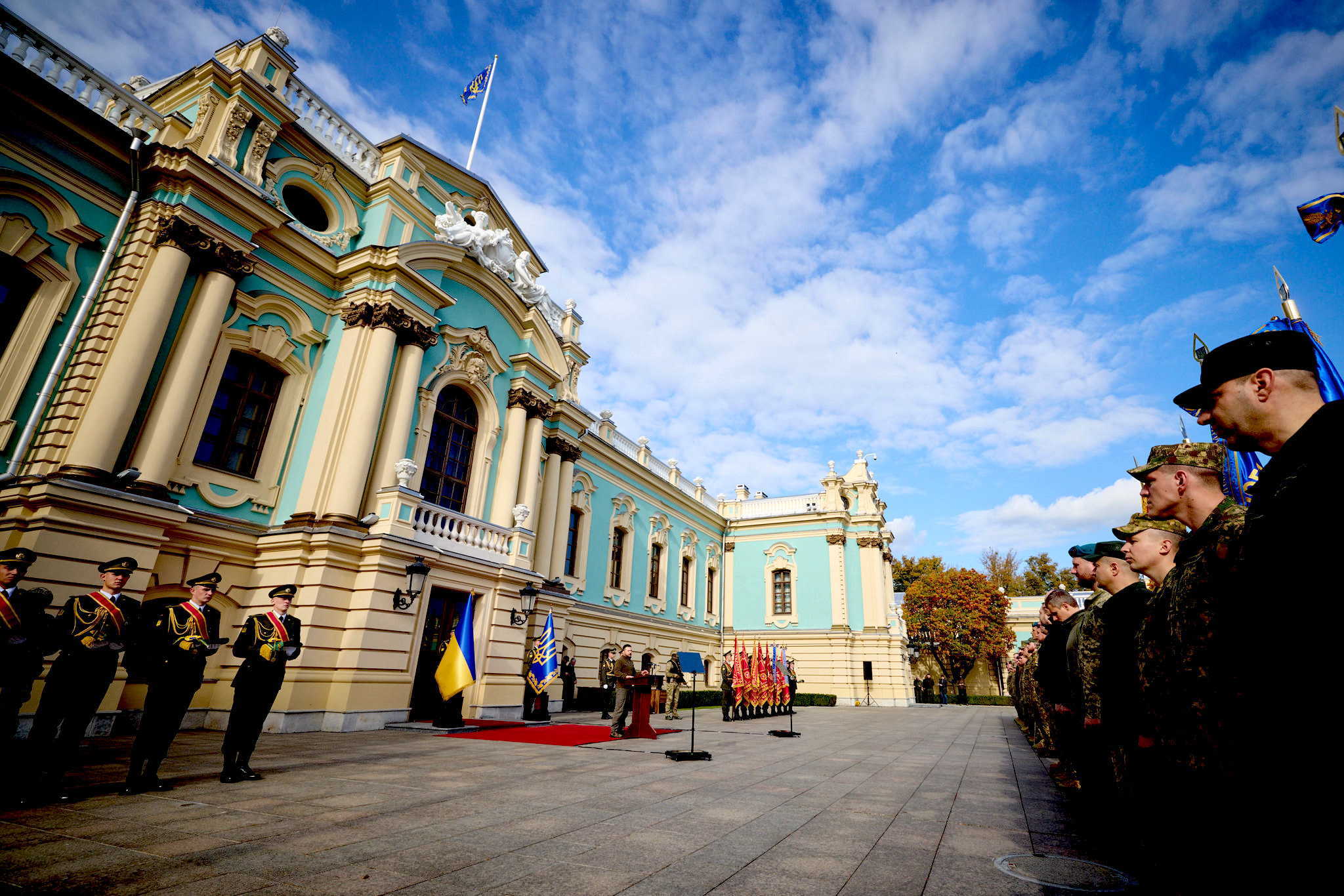
Ukraine’s President Volodymyr Zelensky congratulating soldiers on the Day of Defenders in October near the Mariinsky Palace in Kyiv. (President Of Ukraine, Public domain)
 The nice thing about being an oligarch is that you are so wealthy it doesn’t matter that you are looked upon as a predatory pariah.
The nice thing about being an oligarch is that you are so wealthy it doesn’t matter that you are looked upon as a predatory pariah.
The nice thing about being an American oligarch, such as Jeff Bezos, is that America does not have oligarchs: It has highly successful business executives and entrepreneurs.
Bezos can build Amazon into something that looks very like a monopoly, he can own The Washington Post and sign contracts with the Central Intelligence Agency, he can have a net worth of $114 billion. But he is still a highly successful businessman, not an oligarch. He is a “job-creator,” a phrase of which I have long been fond.
The new fashion among government officials, economists, think tank inhabitants, bankers, investors, multilateral bureaucrats, and the journalists who faithfully copy down what they say is to forecast what kind of place Ukraine will be once the war is over.
And here’s the thing: Ukraine has oligarchs, and the postwar Ukraine these people have in mind cannot have oligarchs. Highly successful business executives and entrepreneurs with vast holdings, the same holdings from which they now profit, O.K. But they have to be executives and entrepreneurs, not oligarchs.
Nomenclature is all when it comes to postwar Ukraine, you see. Bezos and the reporters whose checks he signs understand this very well.
The working assumption among the people given to big think is that the Kiev regime and its Western backers will prevail against the Russian Federation and have their way in postwar Ukraine. We can leave the wisdom or otherwise of this prognosis for another time.
Of immediate importance is that those beginning to plan for the future anticipate “a new, strong, European Ukraine,” a Ukraine that “will follow a European or U.S. model,” a nation with “more lawyers and less [sic] bribers,” “a free-market Ukraine.”
These phrases can all be found in a long takeout The Washington Post published Dec. 8 under the headline, “War has tamed Ukraine’s oligarchs, creating space for democratic change.” This is The Post’s contribution to the conversation about what Ukraine will look like and how its economy will work once Russian forces have been beaten back across Ukraine’s eastern border.
In 4,200 words, Bezos’ newspaper wants to tell us that all will be well in postwar Ukraine, where oligarchs will be no more and the business executives they have become will make Ukraine democratic, modern, and — a neoliberal code word here — efficient.
Ukraine’s crop of oligarchs, like the Russian Federation’s, date to the years immediately after the demise of the Soviet Union. What the inebriated Boris Yeltsin, tool of neoliberal Clintonians, did to post–Soviet Russia, Leonid Kuchma did to Ukraine.
Kuchma’s presidency, from 1994 to 2005, was a godawful mess of fraud, corruption, and media censorship. Among much else, he set in motion and oversaw the same sort of rapacious, free-for-all privatization schemes Yeltsin got going in Russia. Your typical Ukrainian oligarch active during the Kuchma years will have paid taxi fare for state-owned and–operated assets worth billions.
In Ukraine’s case, a weak central government and underdeveloped institutions meant that corruption per capita, let’s say, was often worse than in the Russian Federation. It ran to the very foundations of society and government.
The people policing corruption were corrupt. Those who assumed high office were corrupt. Petro Poroshenko, who replaced the corrupt but duly elected Viktor Yanukovych after the U.S.–orchestrated coup in 2014, made an oligarch-sized fortune in chocolate candy.
The Post piece offers a useful example of how this worked. In 2004, Kuchma’s penultimate year in office, an oligarch named Rinat Akhmetov and another oligarch named Viktor Pinchuk paid $800 million for Kryvorizhstal, a major state-owned steelmaker. Pinchuk had married Kuchma’s daughter two years prior to this transaction.
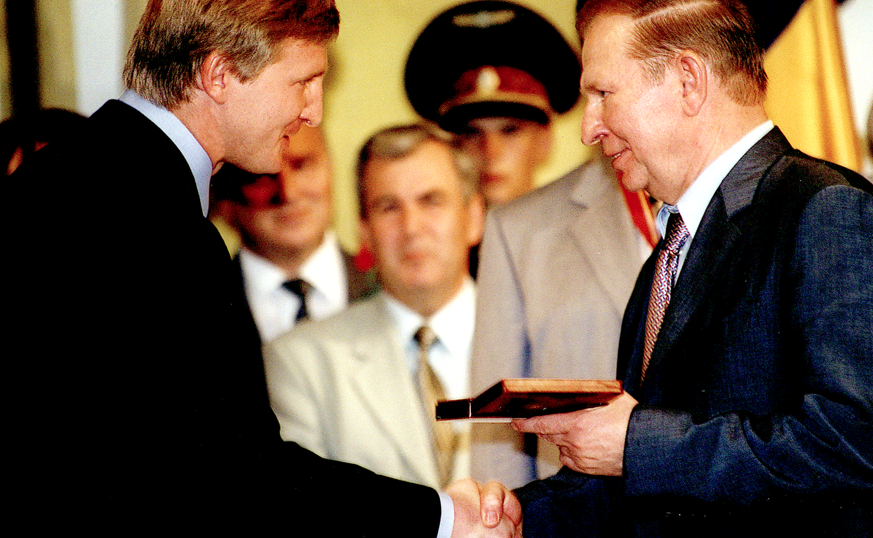
Rinat Akhmetov and Leonid Kuchma, the second president of independent Ukraine, around 2005. (CC BY-SA 3.0, Wikimedia Commons)
Everyone savvy in these matters knew the price Akhmetov and Pinchuk paid for Kryvorizhstal was preposterously low, a brazen rip-off of an asset rightfully the property of the Ukrainian people.
Viktor Yushchenko canceled the deal after he replaced Kuchma as president in 2005. The government then sold Kryvorizhstal to Mittal Steel, an Indian company now part of Netherlands-based ArcelorMittal, for $4.8 billion.“The transaction was clearly corrupt,” The Post quotes Yushchenko as saying, presumably in a recently conducted retrospective interview.
Yushchenko came to power as a reformist in consequence of the late–2004, early–2005 Orange Revolution — this after he was poisoned and badly disfigured with dioxin by nobody knows who. Still popular among Western liberals, he is occasionally quoted in support of the Zelensky regime’s war against Russia.
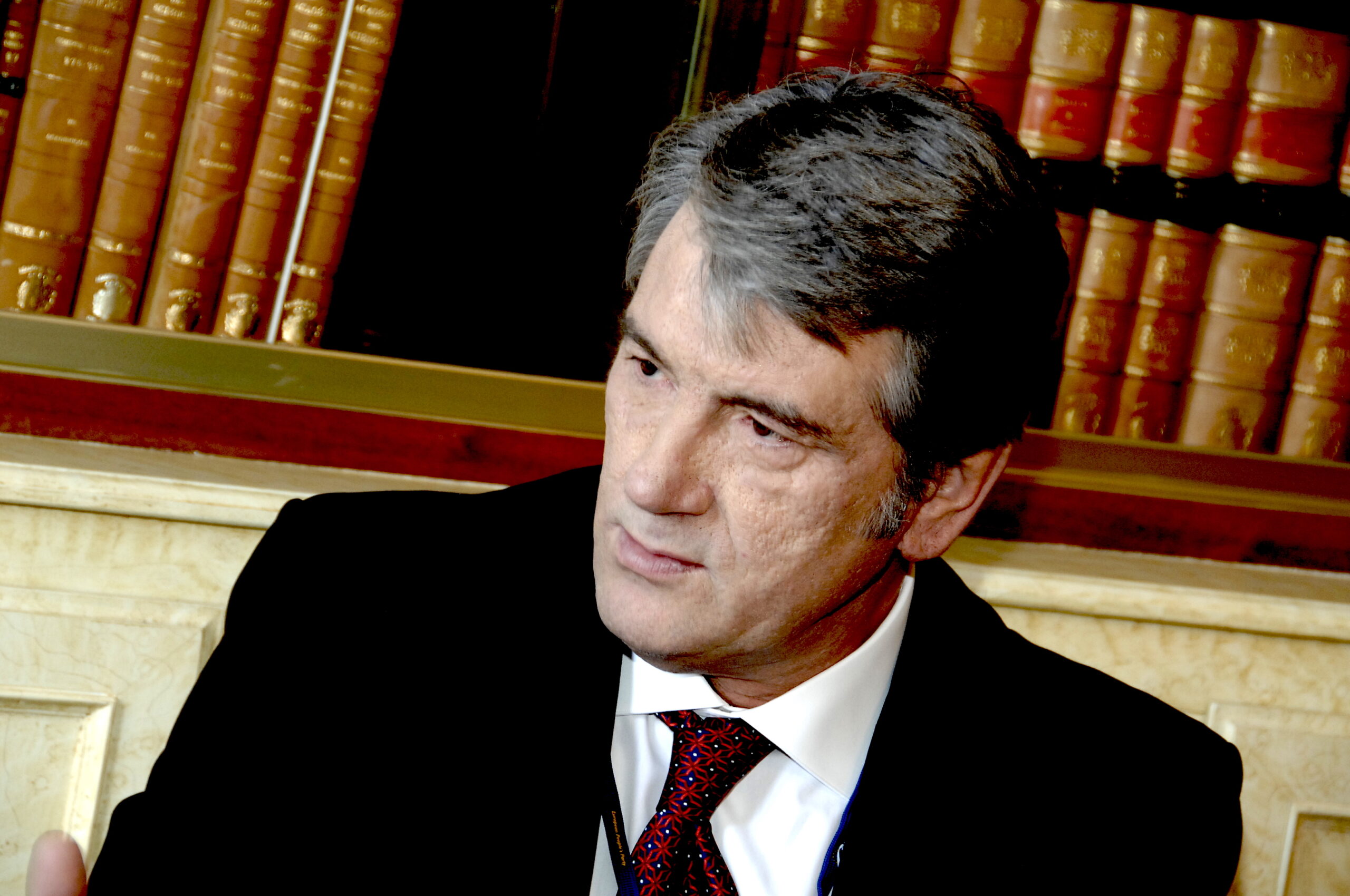
Ukraine’s Viktor Yushchenko in March 2009. (European People’s Party, CC BY 2.0, Wikimedia Commons)
Yushchenko did not have an oligarch problem and wasn’t one himself. But neither did he manage to tame them, to take the Post’s phrase. Volodymyr Zelensky, the current president, has had an oligarch problem the whole of his political career.
As a TV comedian who became president, he was more or less invented by Ihor Kolomoisky, an oligarch (media, banking, diversified businesses organized as the Privat Group) with long tentacles reaching into government and politics.
Kolomoisky is among the richest of Ukraine’s oligarchs and apparently among its most corrupt. Last year the Justice Department banned him from entering the U.S., and, in apparent response, Zelensky began to distance himself from his former (let us assume former) patron. First, he stripped Kolomoisky, who resides in Israel, of his Ukrainian citizenship.
And then something interesting. Zelensky went on to introduce what he called his “de-oligarchization” bill in the Rada, Ukraine’s legislature. It passed easily into law a year ago last month. You haven’t read much about this law — if you have read anything of it, indeed — because it does not seem to have made any difference.
So far as I can make out, Zelensky saw a political opportunity when his sagging support indicated he needed one: Being seen to act against the nation’s parasitic oligarchs is a surefire boost among the ordinary Ukrainians whose assets many of them have stolen.
The most interesting thing about the de-oligarchization law is not its ineffectiveness but its definition of an oligarch. Here we begin to approach the true point of the Post’s piece about these people. In thePost’s words:
“The new law defines an ‘oligarch’ as anyone who meets at least three of four criteria: influence in politics, media holdings, economic monopolies, and minimum assets of $100 million.”
Let us use the Zelensky law as a mirror. In it we find that oligarchs are too visibly and directly influential among Ukrainian politicians and holders of high office, they make political use — again, too visibly—of overly concentrated media empires, and they steamroll competitors in the industries where they dominate. We can leave out the monetary threshold, given how low the law sets the bar.
Support CN’s Winter Fund Drive!
Why now, after 31 years as an independent nation and nearly as many with the most oligarch-ridden economy in Europe, do these criteria matter? I do not find this a difficult question to answer.
It is because the Ukraine that is supposed to graduate into the ranks of the European Union and NATO has to look good. And it will not look good so long as oligarchs carry on with their crude intrusions in national politics, their indifference to legal statutes, and their incessant bribery, graft, and other sorts of corruptions.
It is time, in short, for Ukraine to clean up its act. It can be an act, indeed, but the oligarchs have to be sent back to makeup, and then to wardrobe, and altogether recast as modern business executives. They have to be worthy of straight-faced profiles in Forbes or BusinessWeek, to put this point another way. They have to look more like Bezos than the shameless crooks and greedheads they actually are.
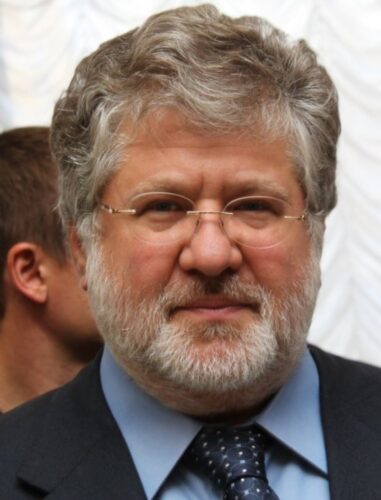
Ihor Kolomoyskyi in 2013. (CC BY 3.0, Wikimedia Commons)
The war, the de-oligarchization law, and public discontent have oligarchs on the run, the Post reports, but I couldn’t find a single oligarch on the run in this story.
Ihor Kolomoisky doesn’t live in Ukraine anymore and comes over as indifferent to the allegations against him in reports I have read. Of the other oligarchs mentioned, Serhiy Taruta co-founded and runs a metals-industry group based on privatized state assets, has held several political offices, has had a seat in the Rada since 2014, and seems to entertain presidential ambitions.
Not exactly a man on the run.
Taruta is good friends with the aforementioned Rinat Akhmetov, he of the foiled steel company swindle, and speaks very highly of him. “He was not a member of a criminal group, but he knew and he was friends with people who were,” Taruta tells the Post. This kind of thing counts in oligarchic Ukraine.
Akhmetov is the son of a coal miner, founded a coke-processing plant soon after Ukraine gained independence, and made it big in metals during the Kuchma years, the Kryvorizhstal bust notwithstanding. At its height prior to the current war, his fortune was worth $7.6 billion; he has taken a hit since the outbreak of hostilities: He is now worth a mere $4.3 billion, poor fellow.
Akhmetov gets an inordinate proportion of the Post’s linage in its report on the state of the Ukrainian oligarchy. The piece reads in part like a personal profile, indeed. Why is this?
Akhmetov is precisely the kind of oligarch the Post wants to show us, in my read. Dominant in the metals sector, politically powerful, elected to the Rada in 2006, friends among crime bosses, he represents all that was wrong about the oligarchs. And now he has seen the light.
He has bailed out of politics, at least directly. He has seen the future of the Ukrainian economy, and it shines brightly with none other than highly successful business executives and entrepreneurs.
“I am not an oligarch,” He tells the Post. “I am the biggest private investor, employer, and taxpayer in Ukraine.” And later: “Competition in the economy means market economy. Competition in politics means democracy.”
There is this from Rostyslav Shurma, one of Zelensky’s top advisers and — I love this part — previously a senior executive at Metinvest, a steel producer Akhmetov owns: “It is absolutely essential we have strong businessmen, we have national champions, global champions. But they should not interfere in politics.”
Yes! the Post report urges us to conclude.
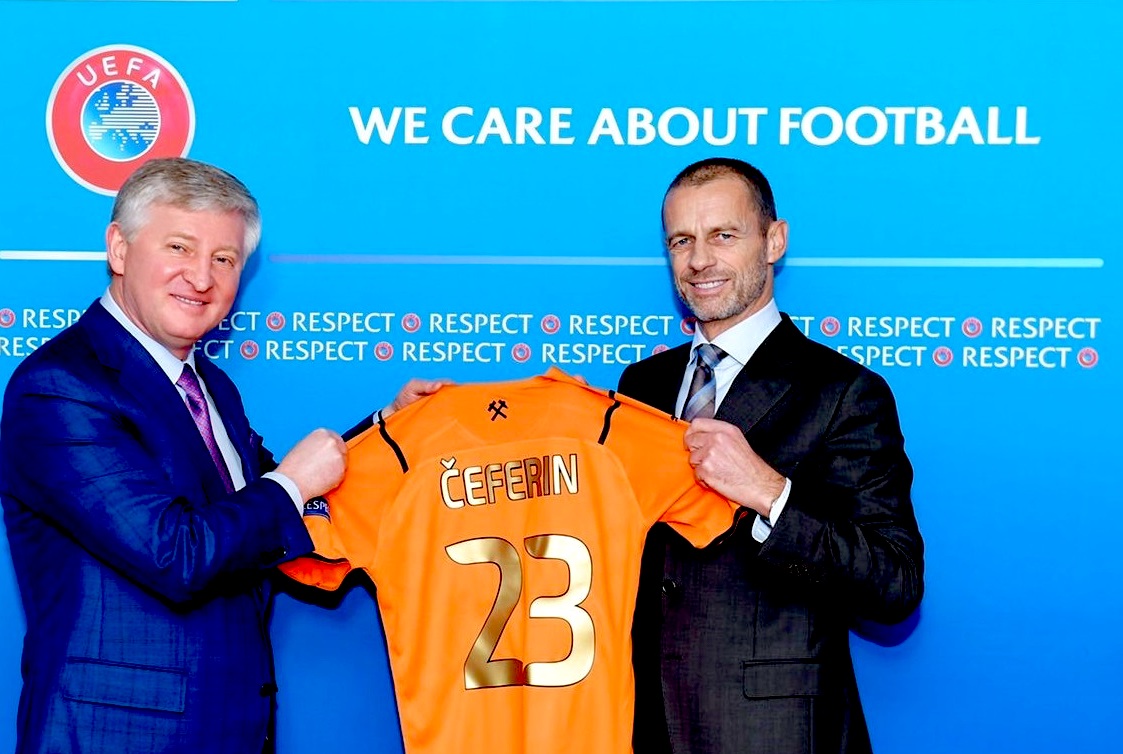
Rinat Akhmetov, left, giving Aleksander Ceferin the UEFA Football leadership award, December 2021. (CC BY-SA 2.0, Wikimedia Commons)
I read all this against the background of the not-much-reported deliberations of those on the international scene planning the future shape of the Ukrainian political economy. High among the groups involved is the Ukraine Recovery Conference, which has met annually for the past five years.
Last summer’s gathering, in Lugano, Switzerland, included five heads of state, 40 government ministers, 60 international organizations and a large Ukrainian delegation.
Patricia Cohen, a New York Times economics correspondent, wrote a creditable piece last week — creditable for its forthright honesty — describing this discourse under the headline, “Away From the Spotlight, a Debate Rages Over a Postwar Ukraine Economy.”
As Cohen makes clear, two things are going on at present. Abroad, all the talk is of how to reshape Ukraine into another specimen of neoliberal savagery with all the inequality, social dislocation, and disparities, and the unbridled corporatization this model brings with it.
In Ukraine, the Zelensky regime is hard at work laying the groundwork for this objectionable transformation — stripping workers of rights and protections, cutting regulation, opening the gates to foreign resource exploitation, shutting down the press, forcing the political parties to conform or close.
Please consider the above list of things to come in Ukraine should the West win this war: inequality, corporatization, the absence of regulation to curb excess, abuses of labor. Does this remind you of anything? The America that made Bezos a highly successful business executive, maybe?
Ukraine’s task is simply to get this done by way of the fiction that, in a neoliberalized political economy, there is some imagined distance between government and the corporate sector. There is none in America and there shall be none in Ukraine.
The kicker at the end of this dismal piece of Washington Post propaganda leaves us precisely where Jeff Bezos would want us. It quotes a financial journalist in Kyiv named Yurii Nikolov. “I hope the businessman Akhmetov will remain with us,” he tells the Post, “and oligarch Akhmetov will not be reborn.”
It is all a question of nomenclature, nothing more.
Patrick Lawrence, a correspondent abroad for many years, chiefly for the International Herald Tribune, is a columnist, essayist, author and lecturer. His most recent book is Time No Longer: Americans After the American Century. His Twitter account, @thefloutist, has been permanently censored. His web site is Patrick Lawrence. Support his work via his Patreon site. His web site is Patrick Lawrence. Support his work via his Patreon site.
https://consortiumnews.com/2022/12/16/the-autumn-of-oligarchs-in-ukraine/




Geen opmerkingen:
Een reactie posten